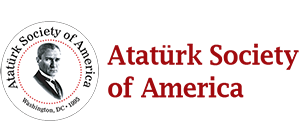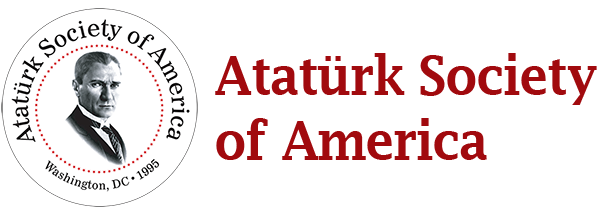Concerning MUSTAFA KEMAL ATATÜRK – who authored an “Epic of Resurrection” by rendering the Çanakkale Straights (Dardanelles) impassable, the leader of the struggle for Turkish national sovereignty, the commander-in-chief of the War of Independence, the pioneer and architect of the Turkish Revolution – I say to those representatives of ignorance who accuse him of dictatorship, and those with prejudiced opinions such as Stefan Ihrig who exhibits the carelessness of comparing him with butcher dictators- the founders of Fascism and Nazism, here is my response:
1. Not one individual of the Turkish Nation defined by Atatürk in his handwritten book entitled “Medenî Bilgiler” (“Civic Knowledge”): “The people of Turkey who founded the Republic of Turkey are called the Turkish Nation” has likened their “Ata” or founding father to a dictator. They have always laid claim to and defended his principles and the Turkish revolution effected under his leadership, and have made it their solemn duty to pass on Kemalist thought like a banner from one generation to the next.
(How could a “dictator” win such extraordinary love and respect from his nation? Or be deeply respected as the 20th century’s face of honour and the vanguard of the 21st century?)
2. The Turkish Republic liberated and founded by Atatürk did not apply to become a member of the League of Nations. In 1932, in contrast to the prevailing rules and trends, the founding members ceremoniously invited the Republic of Turkey to become a member.
(Would a “ dictator’s” country be shown such respect or accorded this much importance ?)
3. In 1981, the one-hundredth anniversary of Atatürk’s birth, his memory was honoured by the United Nations declaring it the world Year of Atatürk, the representatives of 156 nations attending the UNESCO General Assembly in 1979 – including those of all the Western powers- having unanimously voted to pass the Atatürk Centennial Resolution. Let’s recall this historical resolution:
“MUSTAFA KEMAL ATATÜRK was
– an outstanding individual who worked towards international understanding and peace,
– an exceptional reformer,
– leader of one of the earliest struggles against colonialism and imperialism,
– respectful of human rights,
– a leader for world peace,
– an incomparable statesman who advocated co-operation and harmony among people with no distinction based on
colour, religion or race,
– the founder of the modern Republic of Turkey…”
(Could a “dictator” merit this description by UNESCO?)
4. During the 1920s and 1930s when totalitarian regimes gained power and ground – Fascism in Italy, Nazism in Germany and Communism in the USSR – and destroyed world peace, many Western scientists, politicians, musicians and artists fleeing Hitler’s Germany found salvation and freedom in ATATÜRK’s Turkey.
(How could it be that people escaping from a country ruled by a Nazi dictator would choose the country of another “dictator” in which to settle, and be proud and honoured to be a citizen of that country?)
5. We should not forget Atatürk’s own reply to those who compared him to a dictator, which was: “Dictatorship is different, another thing entirely. The West does not yet comprehend Turkey or what has happened in Turkey. They do not know the characteristics of Turkey. If they knew them, (the British, French and Italians) would not have violated our land; the French would not have invaded Çukurova, the Greeks would not have landed in Izmir, they would not have sent them all the way to Ankara.
Because I have been of service to them, our people see me as an elder of the family and respect me as such. The head of the family is a very important figure for we Turks. Some daft people interpret the attachment and respect shown to me as dictatorship. I must confess this upsets me. There are some innovations I have been considering for a long time. I share these ideas with a lot of people. If we agree, we begin putting them into practice. All of the reforms are made according to the law, that is – with the consent of the government and approved by the Parliament. Nor do we do things suddenly. We progress gently. We allow some time between things. If I were a dictator, could Terakkiperver have founded the Republican Party? Would Parliament have been able to reject two articles I considered beneficial for the Constitution? I have been trying to persuade Ismet Pasha and gain a majority in the Parliament for three years in order to reform our alphabet. If I were a dictator, I would say, “This will be done,” and it would be. Our single party is not like a fascist or communist party. We are not exclusive, uniform, monotype like they are. Everyone can become a member. That is why there are representatives of all kinds of ideology except supporters of sultanship in our party. Would a dictator’s party be like this? Our constitution is favourable to the founding of more than one party. I have never spoken against democracy like Mussolini. On the contrary, we all state that democracy is our ideal at every opportunity we get. We do not have a uniformed youth branch armed with guns and coshes, nor an extensive police force. We even found out about the assassination in Izmir via motorbiker Şevki, and the second plot was discovered purely by chance. Since the beginning of the struggle for national independence, I have not done one thing without a ballot or assembly. I have always worked through vote, with the Parliament and elected councils. I conducted the War of Independence with the Parliament, without martial law or censorship. Dictators have armies to suit themselves. Our army belongs to the people; it is the army of the Republic. Now, in order to protect the republic and modernity, we do not permit religion to be exploited . So is this autocratic? The moment you allow an opportunity for the exploitation of religion, there will be sects, cults, secret madrasas, and witch doctors everywhere. New superstitions will be added to the existing ones. Shrines will overflow with visitors. Pan-Islamism will rise again. Religionists will repress society. They will damage the national state. The solidarity we have struggled to attain will be splintered. We are trying to promote cooperation, unity and peace in our society. Our desire is to advance towards civilization and a democratic Republic.”
6. Atatürk brought legal rights to freedom and equality for women, which is an essential condition for democracy; he enabled each individual to use his or her own wit and will without being subject to persons of self-proclaimed superiority, thereby saving our citizens from slavish servitude.
(Could someone who was a “dictator” have secured these rights?)
7. Atatürk made great efforts to propagate his philosophy of freedom in the society, saying “A republican regime means a state with a democratic system,” and “Free-will and sovereignty belong to the whole people and must belong to them. All manner of liberty of the individuals that comprise a nation must be ensured within that nation – the freedom of lifestyle, freedom of labour, thought and conscience.”
(Would a “dictator” try to teach these values to a people who did not know the meaning of freedom and democracy?)
8. Atatürk defended judicial independence, saying “When a state does not have an independent judiciary, the independence of that state itself is questionable.”
(Is it possible for such an idea to be defended by a “dictator”?)
A figure with no precedent in world history, Atatürk was the founder of the Republic of Turkey, a pioneer and exemplary statesman who paved the way to a republican democracy. He is a source of honour and pride for the Turkish nation. The keys to Atatürk’s success are the nation state, republic, democracy, liberty, independence, peace at home and in the world, a secular state, the rule of law and women’s rights.
Atatürk’s system of thought, encapsulating the principles of modernity, continuity of reform, leadership of the future and enlightenment, is an indispensable feature of Turkey.
To those would-be writers who, instead of promoting international peace, use their fountain pens to sow the seeds of hate in the world, who conduct smear campaigns of betrayal and blame against Atatürk; to people who try to mislead world public opinion, I consider it my duty to especially remind them that:
To compare Atatürk to dictators, to genocidal executioners – to write and say what they do about the great statesman who made pacts of friendship and cooperation with neighbouring states, who wanted “Peace at home, peace in the world,” and said “Unless the existence of a nation is threatened, then war is murder,” – is to betray science, the truth and humanity…
Dursun ATILGAN
President of Federation of Kemalist Thought Associations
in Europe

